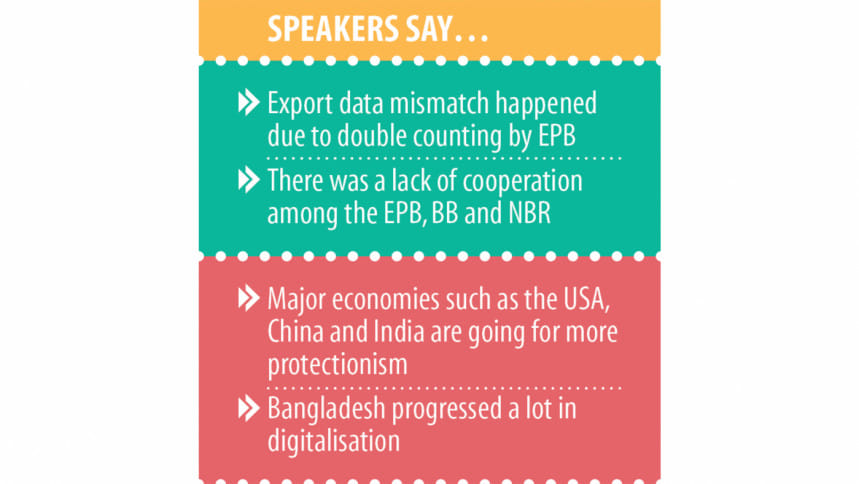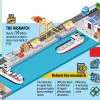Export data mismatch a result of double counting by EPB

One of the main reasons for the $14 billion discrepancy in the export data was the Export Promotion Bureau's (EPB) double counting of exported garment items made in factories inside export processing zones (EPZs), Salman F Rahman, the prime minister's adviser on private industry and investment, said yesterday.
He also attributed the data mismatch to a lack of cooperation between the EPB, the central bank, and the National Board of Revenue (NBR).
The central bank recently corrected anomalies in export figures, revising down actual exports in the July-April period of fiscal 2023-24 by nearly $14 billion compared to the data the EPB had published earlier.
As per data from the EPB, exports stood at $47.47 billion in the first ten months of fiscal 2023-24. However, after the correction by the central bank, it has fallen by $13.8 billion to $33.67 billion.
The mistake that the EPB made was counting sales by companies in the EPZs twice -- first during shipment from the EPZs to local firms and second during shipment from the ports by the exporters.
Rahman made the comments at a roundtable on digitalising international trade in Bangladesh, organised by the International Chamber of Commerce-Bangladesh (ICCB) at the Sheraton Dhaka. Alongside the prime minister's adviser, chamber leaders, government high-ups, trade-related experts, business leaders and exporters also participated.
Furthermore, in the case of garment orders under a manufacturing process known as cutting, making and trimming (CMT), the EPB calculated the prices of fabrics and all accessories, although it was supposed to consider only the fabric cutting cost, sewing cost and finishing cost.
The problem has been identified and it is expected that the EPB, BB and NBR will sit together to address it, Rahman said.
He added that Bangladesh has progressed a lot in the digital economy and the country is now thinking about introducing QR code-based payment systems.
He also said that international trade does not depend only on Bangladesh, highlighting the responsibility of counterparts. But major economies like China and the USA are becoming more protectionist and are maintaining very stringent controlling regulations for international trade.
ICCB vice-president AK Azad cited data from the World Trade Organization, saying that of the total merchandise trade worth $25.3 trillion in 2022, average cross-border transactions required around 36 documents and 240 copies of papers.
As such, Azad called for the formation of a national committee to promote paperless transactions, thereby improving efficiency and reducing the cost of doing business.
ICCB Member Kutubuddin Ahmed said the digitalisation of trade came with the risk of hacking. He said his office software was hacked and the hacker demanded a large sum as ransom. But Kutubuddin did not pay any money. Instead, he recovered the documents manually.
He added that although there may be some hiccups at the start, it is important to educate the people about digitalising trade.
Md Saiful Islam, former president of the Metropolitan Chamber of Commerce and Industry, said Bangladesh ranked 129th among 170 countries in global digital trade, indicating the poor state of the country's readiness for digital trade.
Competing countries such as Vietnam and Turkey were ranked 72nd and 66th respectively, he said.
He added that because of such a poor condition of digital trade, different bodies like BB, NBR and EPB are calculating different export figures.
Digitalising international shipping documents could generate an annual growth of $30-$40 billion in global trade, the ICCB said in a statement.
While moderating the roundtable, ICCB President Mahbubur Rahman said that digitalisation enhances efficiency, reduces costs, and broadens market access.
He said every year, ocean carriers issue about 45 million bills of lading, a crucial shipping document. Many international shipping documents are still not standardised and are mostly paper-based, requiring physical exchanges.
Using electronic bills of lading (eBLs) will speed up transactions and save costs by reducing administrative expenses for cargo handling and document processing while also reducing the risk of fraud through digital authentication, he said.
Edimon Ginting, country director of the Bangladesh Resident Mission at the Asian Development Bank, said effective digitalisation of trade would increase economic growth and create jobs by expanding access to global trade networks for developing economies.
Pamela Mar, managing director of the Digital Standards Initiative of the ICC, presented the keynote.

 For all latest news, follow The Daily Star's Google News channel.
For all latest news, follow The Daily Star's Google News channel. 









Comments